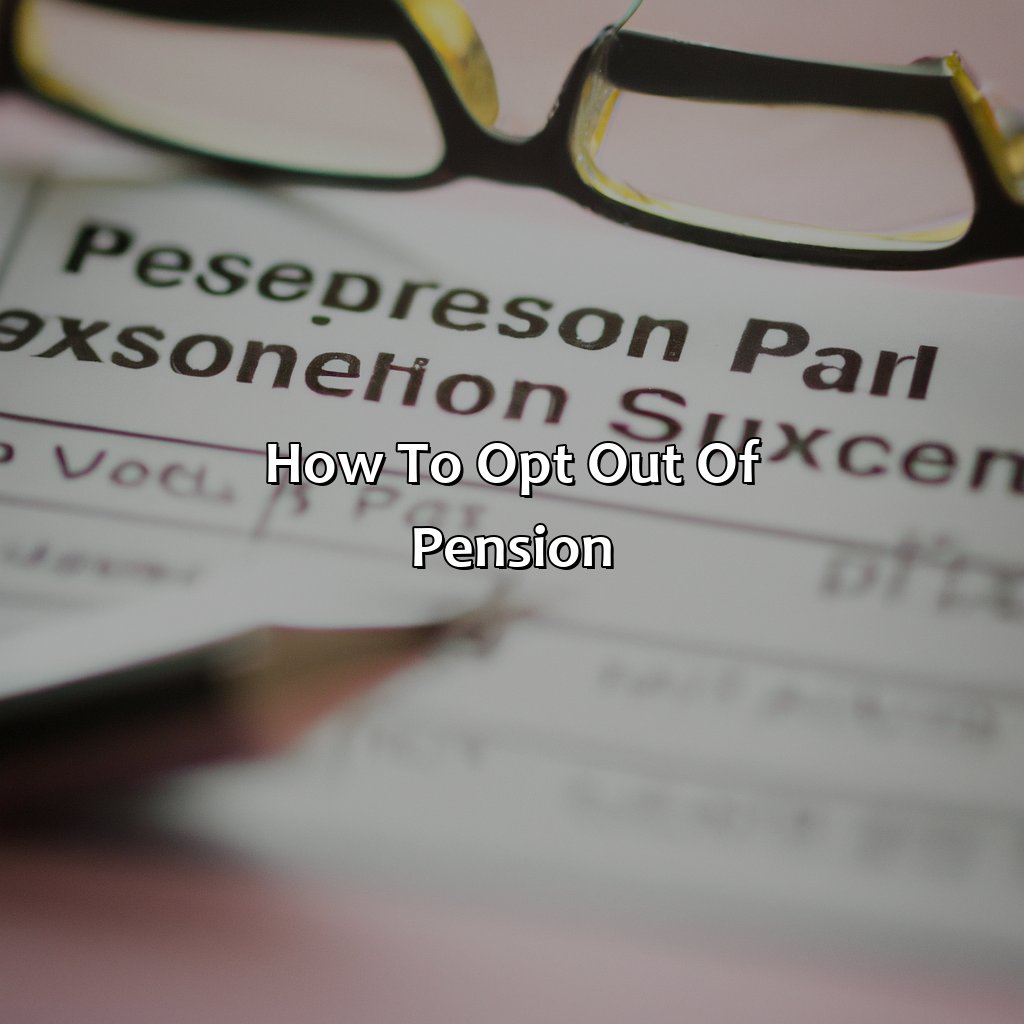How To Opt Out Of Pension?
Key Takeaway:
- There are valid reasons for opting out of a pension, such as wanting to take control of one’s own retirement funds, paying off debts, or pursuing other investments. However, it is important to carefully consider the long-term consequences of such a decision.
- Opting out of a workplace pension requires filling out a form provided by the employer, while opting out of a personal pension requires contacting the provider directly. It is important to keep in mind the deadlines for opting out to avoid any negative consequences.
- Opting out of a pension may result in the loss of employer contributions and may impact retirement income. Alternatives to opting out include changing the amount of pension contributions or seeking financial advice.
Are you looking to opt out of your pension scheme? In this article, you’ll learn the process of opting out and how to make the most out of your retirement savings. With the right information, you can be sure to make the best decision for your future.
Reasons to Opt out of Pension
Opting out of your pension plan can be a significant financial decision, and it is essential to understand the reasons why one may do so. Here are some insights into when it makes sense to opt-out.
Reasons to consider opting out of your pension plan include being close to retirement, having significant financial pressures, wanting more control over your investments, or having a different retirement strategy. Some others are concerned about their employer’s financial stability or may not plan to stay with the company long-term.
- Close to Retirement
- Financial Pressures
- Desire for Investment Control
- Alternative Retirement Strategies
- Concerns about Employer Financial Stability
- Short-Term Employment
While pensions offer many benefits, it’s essential to understand that each person’s circumstances are unique. Factors such as tax implications, other retirement plans, and future earning potential may also have an impact on the decision. Before deciding to opt-out, it’s wise to consult with a financial professional.
Sarah had been with her company for several years and was an active participant in the pension plan. However, during a tough financial period, the company had to make significant cutbacks, including reducing their pension contributions. Sarah was nearing retirement and decided to opt-out of the plan, as she was concerned about the potential impact of additional cutbacks. She consulted with a financial advisor who had helped her create an alternate retirement strategy that was better suited to her needs.
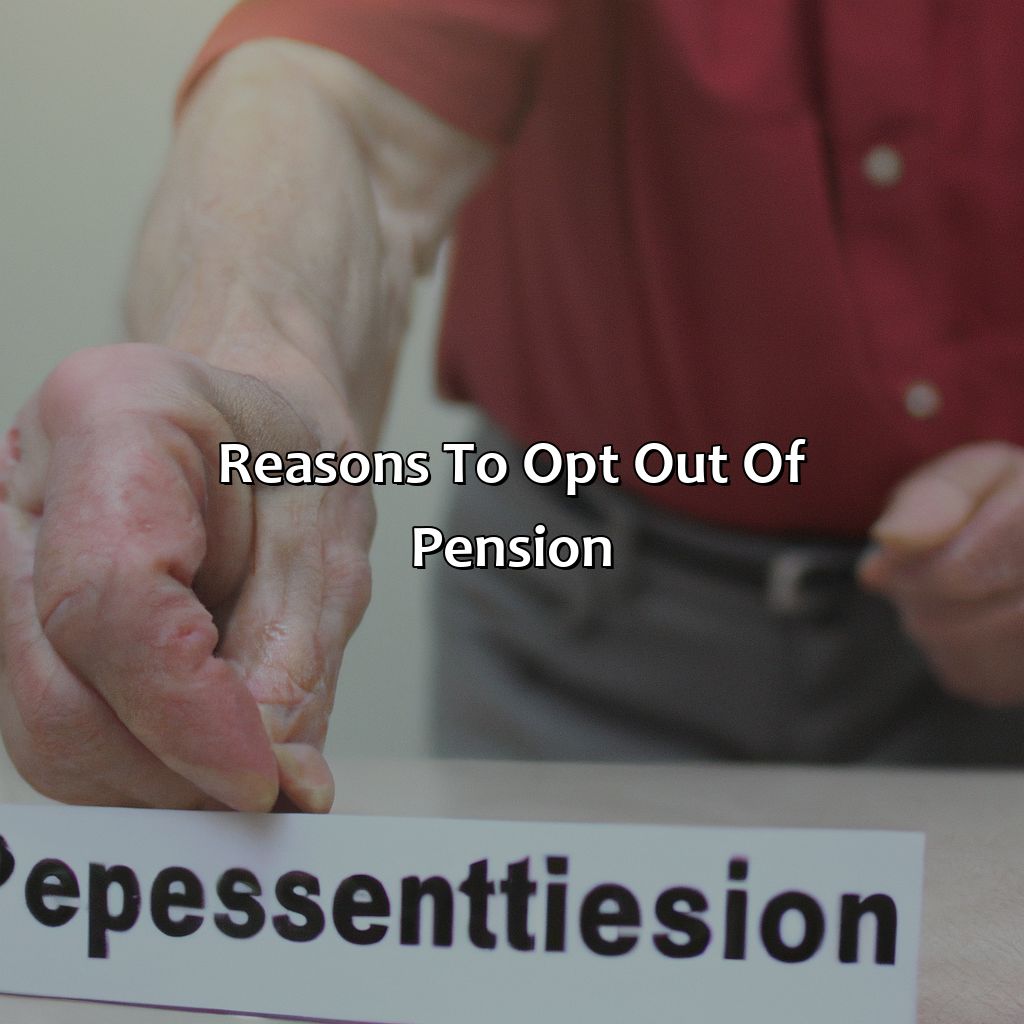
Image credits: retiregenz.com by Adam Jones
How to Opt Out of Pension
Need to escape the pension plan? We’ve got you covered! Options include: bailing out of your workplace pension, or quitting your personal pension. It’s no sweat!
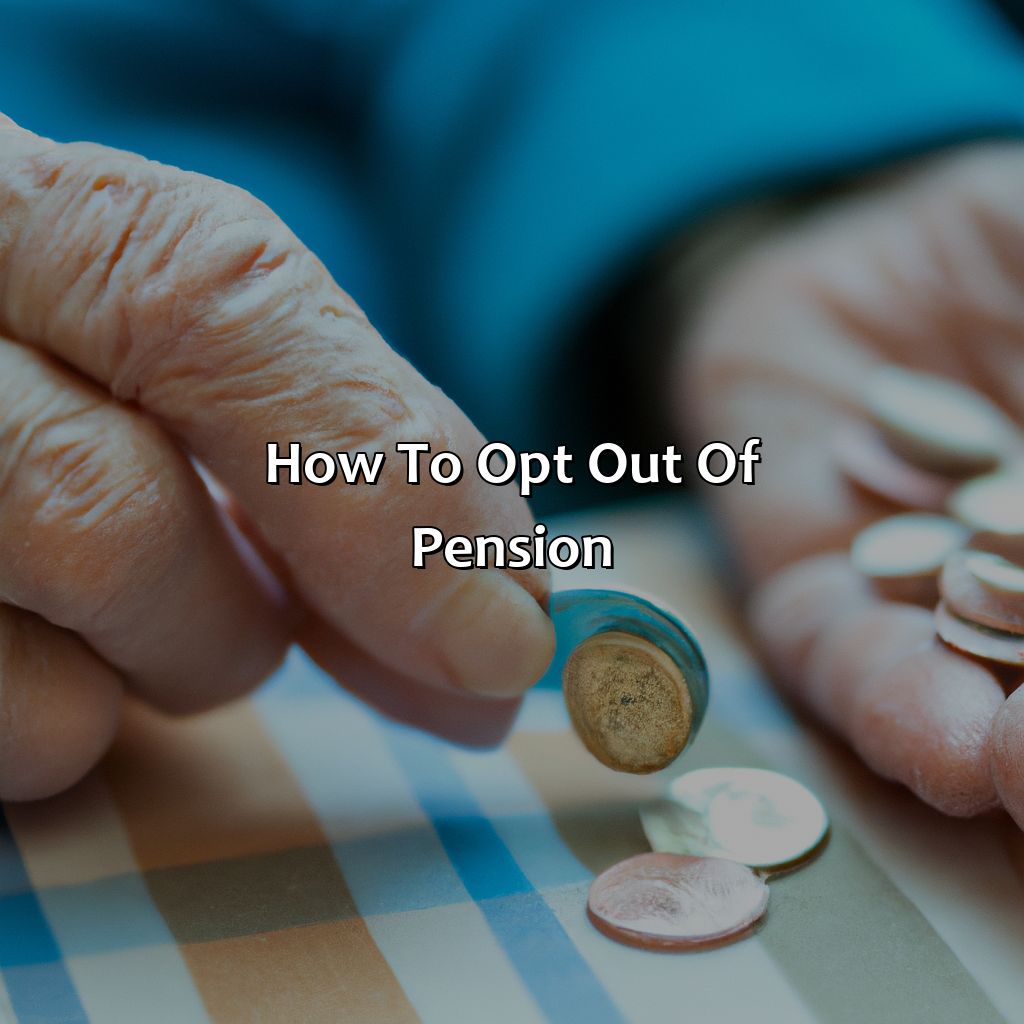
Image credits: retiregenz.com by Adam Woodhock
Opting Out of Workplace Pension
If you are considering opting out of your workplace pension, there are some things you should be aware of. It is important to understand the long-term financial implications of opting out, as it could significantly affect your retirement income.
When deciding whether to opt out, you should first educate yourself on the benefits and potential drawbacks of remaining in a workplace pension scheme. Consider talking to a financial advisor to fully understand the impact on your finances and retirement plans. Are you interested in retiring without a pension? Check out our guide for more information.
If you decide that opting out is the best choice for your individual circumstances, it is important to follow the correct process and deadlines set by your employer. Typically, you will need to complete a form or inform HR in writing.
However, before making any final decisions, consider the importance of having a steady stream of income during retirement and the potential benefits that come with being involved in a pension plan. You don’t want to miss out on an opportunity that could greatly improve your financial security later in life. If you’re looking for options on collecting pension early, there are different ways to do so with proper planning.
Remember, opting out may provide short-term financial relief but could have long-term consequences. Weigh all options carefully before making any decision about your workplace pension plan and seek professional advice if needed.
If you opt out of a personal pension, just make sure the only thing retiring early isn’t your money.
Opting Out of Personal Pension
Opting out of a personal pension plan requires careful consideration. The process involves notifying your employer or pension provider. It’s vital to be aware of the potential consequences of opting out, including losing employer contributions and missing out on government tax relief.
Before making any decisions, it’s crucial to evaluate your financial circumstances and future plans. Are you comfortable with potentially missing out on years of pension contributions? Would you prefer to invest your money elsewhere, such as ISAs or property? If you’re wondering when you can get your state pension, it’s important to consider all your options and make the best choice for your individual situation.
It’s worth noting that some employers automatically enrol their staff into pension schemes under auto-enrolment legislation. However, if you wish to withdraw from the pension scheme, you can learn how to do so within a specific period of joining the scheme.
If you decide that opting out is the right choice for you, ensure that you follow the correct process and maintain a record of any communications in case of future queries or disputes.
In one case, a young employee opted-out of the company’s pension scheme when he joined but agreed with his supervisor that he would be re-enrolled after six months. However, his re-enrolment never occurred due to an administrative error. This mistake wasn’t noticed for over ten years – by which time he had missed out on thousands of pounds in contributions from both his employer and the UK government.
Opting out of a pension is like choosing to skip the gym – it may feel great now, but you’ll regret it later.
Consequences of Opting Out of Pension
To comprehend the repercussions of declining pension, read the article “How to Opt Out of Pension“. Check out the subsections “Loss of Employer Contributions” and “Impact on Retirement Income“. Grasping how these two things are altered when you opt-out may aid you in making a judicious choice which matches your financial aspirations.
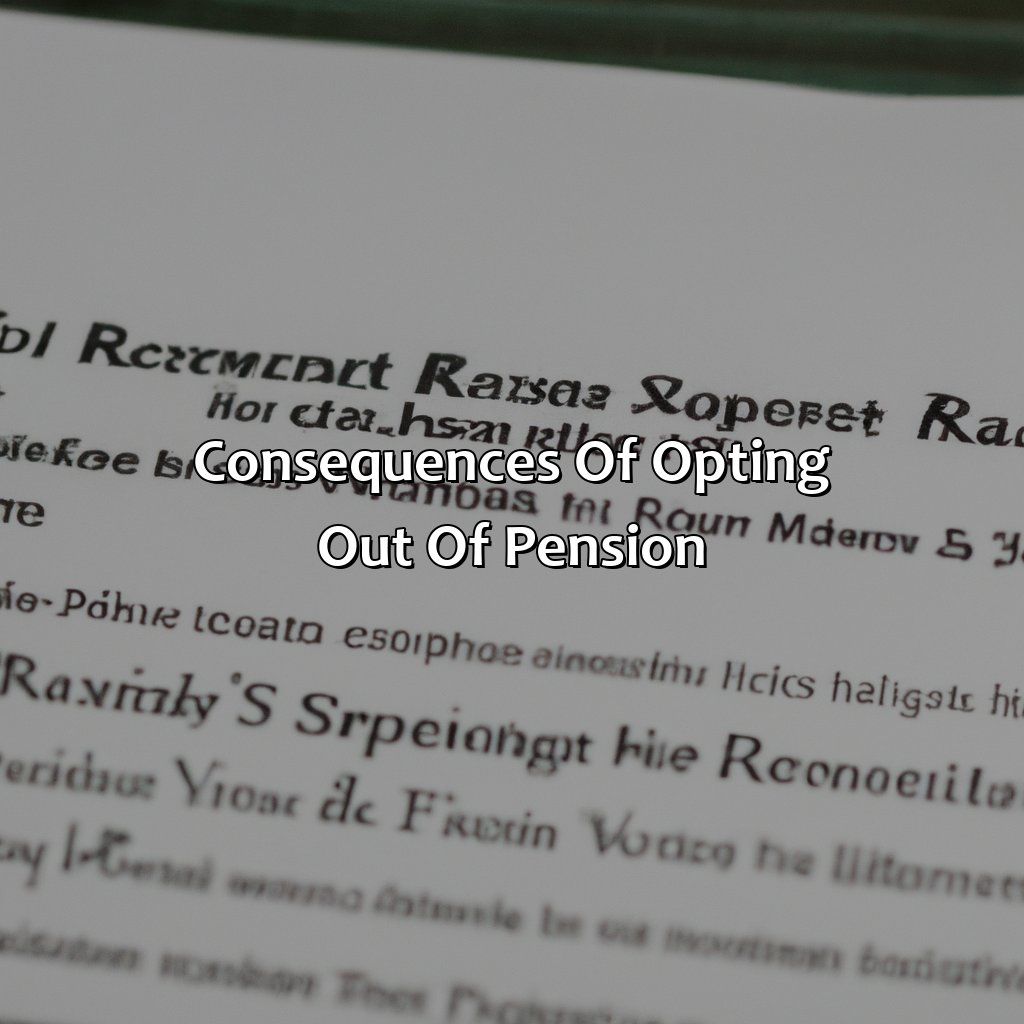
Image credits: retiregenz.com by Joel Duncun
Loss of Employer Contributions
Giving up on receiving Pension Funds from an employer will result in missing out on valuable Employer Contributions towards the funds. The amount contributed will depend on the employment terms and conditions of individual employers, but it can be a substantial sum. Employer Contributions lost may seem small at first glance, but over time, it can translate into significant gains as money grows with interest. Refusing these contributions could mean giving up an essential benefit that employees can leverage during retirement.
It’s crucial for employees to know about what the UK state pension is. Voluntary opt-outs do not exclude them from mandatory deductions. Opting out only exempts them from fulfilling future pension contributions while still liable to past agreements.
Knowledge of the employer’s funded pension plan will help determine the size of financial losses employees incur when opting out of them. Different employers demand varying percentages of the employee’s salary for this contribution. Therefore, individuals must research and understand their pension policies to make informed decisions on how to get a pension.
In 2018, a study conducted by Irish Life indicated that one in four individuals disregarded their employer s Pension Fund Scheme and missed out on secure funding as they approached retirement. Opting out of pension is like playing Russian Roulette with your retirement income – except there’s a bullet in every chamber.
Impact on Retirement Income
Choosing to opt out of a pension plan can have a significant impact on your retirement income. Without the contributions and employer matching funds, your pension fund may not grow as much as it could otherwise. This can result in a lower retirement income than expected.
Additionally, opting out means missing out on the tax benefits and compound interest that come with pension plans. Over time, these benefits can add up to a significant amount of money that could have been saved for retirement.
It is important to note that opting out of a pension is not always the best decision for everyone. Those who are confident in their ability to save independently and invest wisely may be able to make up for the lost pension contributions, but others may struggle to achieve the same level of financial security in retirement. Learn more about Category A State Retirement Pension to make an informed decision.
Before making any decisions about opting out of a pension plan, it is crucial to consider all factors and speak with a financial advisor to determine the best path forward for your individual needs and goals.
Ultimately, fear of missing out on potential retirement savings should be enough motivation to carefully weigh the pros and cons before choosing to opt out of a pension plan. It is never too early (or too late) to start saving for retirement, and every little bit can make a difference in securing financial stability later in life.
Skipping out on your pension is like skipping leg day – sure it seems like a good idea at the time, but you’ll regret it in the long run.
Alternatives to Opting Out of Pension
Want to know how to opt out of pension? Consider these alternatives:
- Adjusting your pension contributions. This can help you save for the future.
- Exploring other financial advice. This may offer a better investment opportunity that suits your goals.
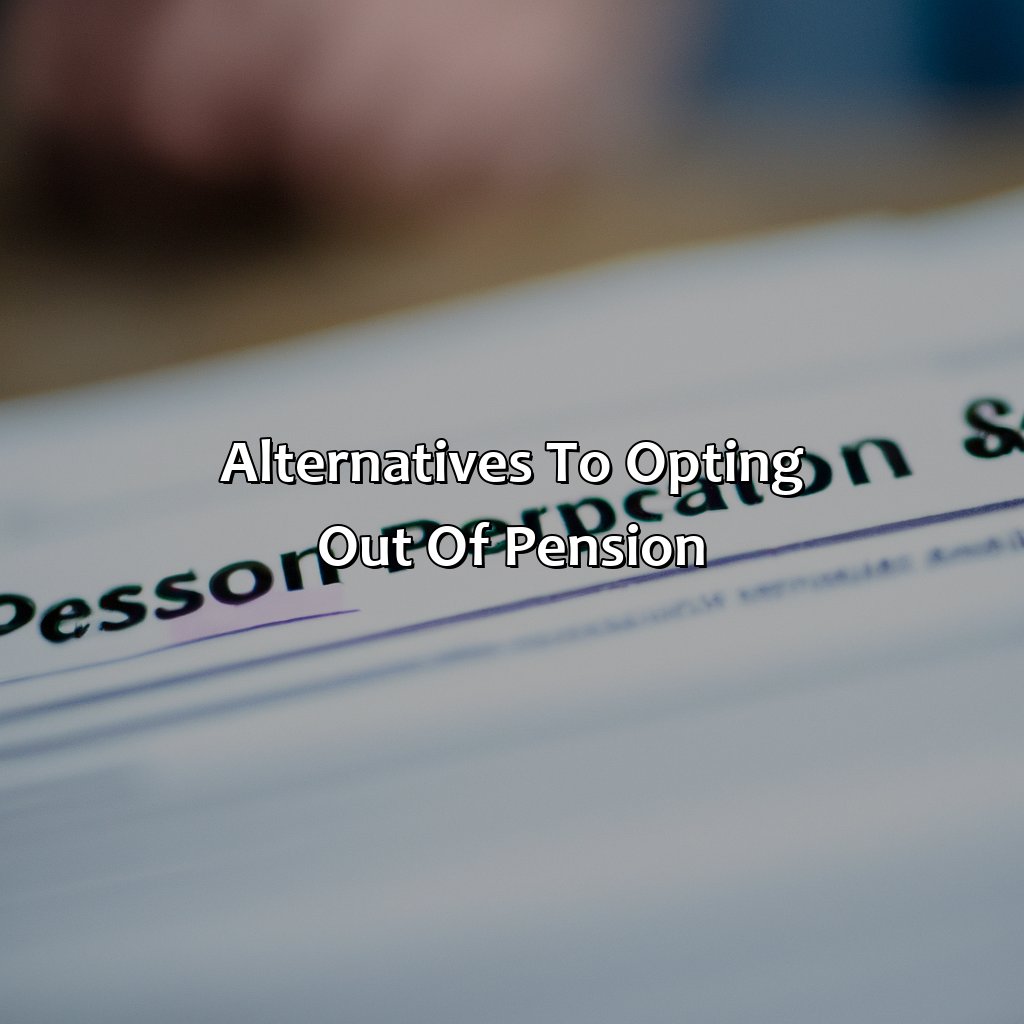
Image credits: retiregenz.com by Yuval Washington
Changing Pension Contribution Amount
Withdrawing from pension may not always be the best option. Altering pension contribution amount is an alternative.
- Visit your company’s HR or payroll department to inquire about changing pension contribution.
- If you have a personal pension plan, check with your provider for any alterations.
- Consider the possible advantages and disadvantages of increasing or decreasing contributions before making adjustments.
- If making changes, complete all forms and return them to the appropriate personnel.
- Confirm that your contribution amount has been adjusted on your payslip after a month or two.
- Review if changes made are working towards achieving financial goals over time.
Not all companies have the same pension contribution options. Make sure to research and understand yours before proceeding with any adjustments.
Remember that altering pension contributions may affect employer contributions, tax implications, and overall retirement plans for the future. If you’re wondering what does opt out of state pension mean, it simply means choosing not to participate in the state pension scheme and instead relying on other retirement savings options.
It is recommended to seek professional advice from a certified financial advisor before finalizing any decisions.
Don’t want financial advice? Just keep pressing that snooze button on your alarm clock and watch your retirement dreams fade away.
Seeking Financial Advice
When navigating pension options, it may be beneficial to seek expert financial guidance. Consulting with a professional can provide insight into the implications of opting in or out of a pension plan, as well as the potential long-term effects on personal finances and retirement. This advice can help make informed decisions that are aligned with individual goals and values.
In addition to seeking guidance from professionals, there are alternative options for those considering opting out of a pension plan. One such option is transferring assets to an ISA (Individual Savings Account) or LISA (Lifetime ISA). These tax-efficient investment vehicles offer flexibility and allow individuals to save towards their retirement goals while having access to funds in the short term. If you’re wondering what to do with your pension when you change jobs, this could be a good option to consider.
It s important to consider individual circumstances when deciding whether or not to opt out of a pension plan. Factors such as age, employment stability, and current financial standing all play a role in determining the best course of action. Seeking financial advice can help navigate these considerations and make informed decisions based on individual needs.
A study by Vanguard found that participants who sought professional guidance received an average annual return of 3% more than those who did not seek guidance. Seeking financial advice could ultimately lead to better outcomes for retirement savings.
Source: https://www.vanguard.co.uk/documents/adv/lit/guiding-lights.pdf
Some Facts About How To Opt Out of Pension:
- ✅ In the UK, employees have the right to opt out of a workplace pension scheme. (Source: gov.uk)
- ✅ Opting out of a pension scheme means giving up the opportunity to receive employer contributions. (Source: Money Advice Service)
- ✅ Opting out of a pension scheme may have negative consequences on your retirement savings. (Source: MoneySavingExpert)
- ✅ Employees can opt out of a pension scheme within one month of enrollment without giving a reason. (Source: PensionBee)
- ✅ Employers are required to automatically enroll eligible employees into a workplace pension scheme. (Source: The Pensions Regulator)
FAQs about How To Opt Out Of Pension?
What is pension opt-out?
Pension opt-out is the process of leaving your pension scheme voluntarily, usually to redirect the pension contributions to other investments or savings.
Who can opt out of pensions?
Anyone who is currently enrolled in a pension scheme can opt out. This includes employees, self-employed individuals, and those who are not currently working.
How to opt out of pension?
To opt out of a pension scheme, you need to inform your employer or the pension provider of your decision. They will provide you with a form to complete and submit. You can also opt out online, through your pension provider’s website.
What happens if I opt out of pension?
If you opt out of a pension scheme, you will no longer make contributions to the plan, and your employer will also stop contributing on your behalf. You may lose any employer contributions already made, and your retirement income will be reduced.
Can I opt in again after I opt out of pension?
Yes, you can opt back into your pension scheme at any time. However, your employer is not required to re-enroll you until the next re-enrollment period, which usually occurs every three years.
Are there any benefits to opting out of pension?
Opting out of a pension scheme may be beneficial for some people, especially those who need the extra cash flow or prefer to invest the money elsewhere. However, it is important to remember that this will reduce your retirement income and may put you at risk of not having enough money to live on after you retire.
